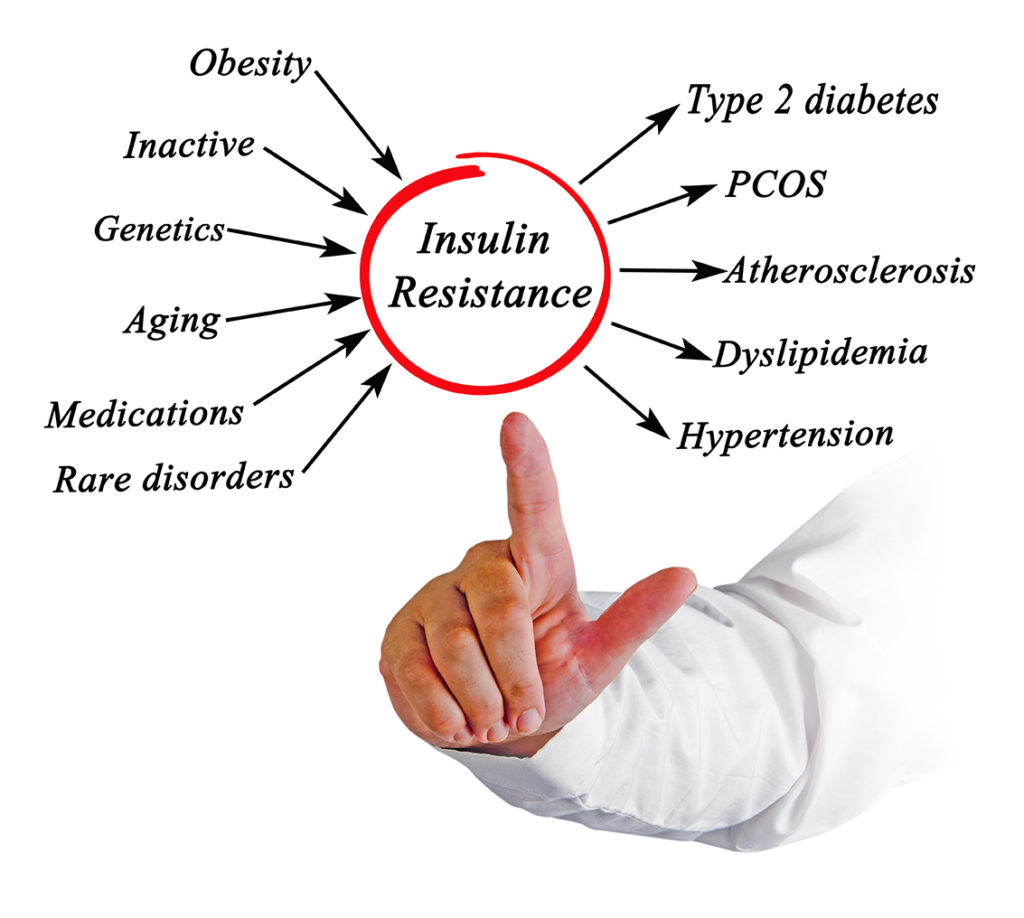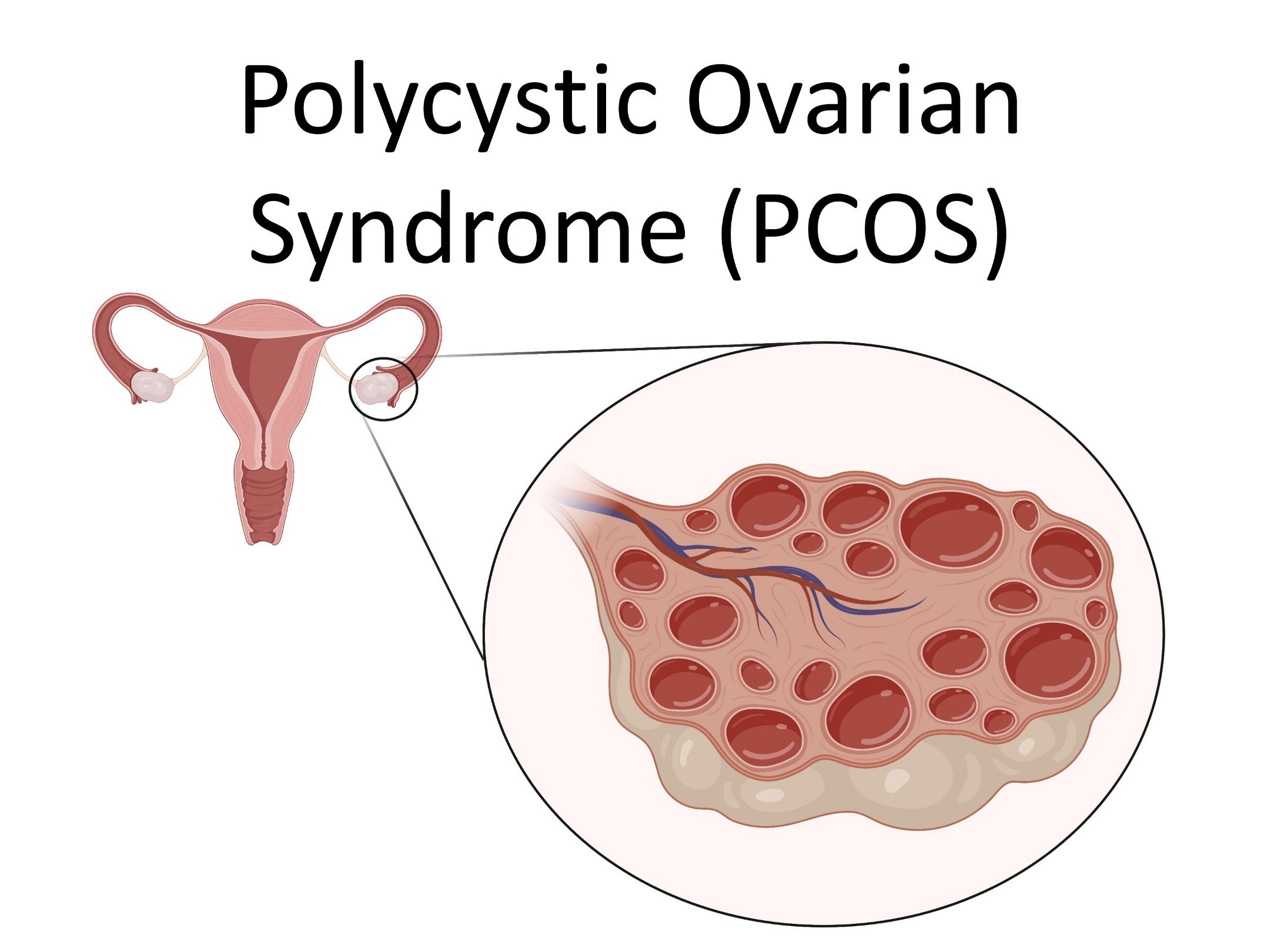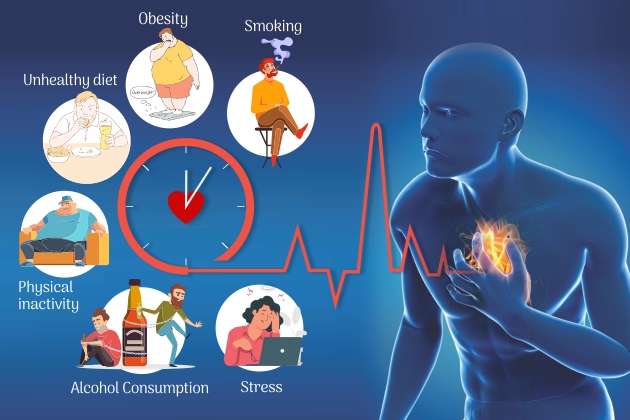
Insulin is a hormone made by your pancreas that helps control blood glucose levels. When you eat, your blood glucose levels increase, and insulin is released to transport glucose from your blood into your cells. When glucose gets into your cells and your blood sugar levels drop, it sends a signal to your pancreas that it’s time to stop releasing insulin. Your cells use glucose for energy and for performing other body functions. For several reasons, your cells do not respond properly to insulin, which means they can’t take and store up the glucose in your blood. The cells become resistant to insulin. This is what we call insulin resistance.
Click here to read more about Insulin Resistance and how it can be treated.

Is your Body Throwing a Sugar Tantrum? It Might be Insulin Resistance!
Most people are not aware of their insulin resistance until their blood is tested. Insulin resistance can be diagnosed by performing several blood tests, which can include:
- Fasting plasma glucose test, which measures blood sugar levels after a minimum of 8 hours of fasting.
- Oral glucose tolerance The test begins with a fasting glucose test, followed by a sugary beverage. Two hours later, another blood test is taken.
- The hemoglobin A1c test shows the average blood glucose level over the last 2–3 months.
These tests help us know if our blood sugar levels are low, normal, normal, or high. We all have high blood sugar sometimes. But when your blood sugar stays high for an extended period of time, you may experience symptoms such as: feeling thirsty more often than usual Urinating more frequently than usual feeling tired, and having blurred vision and tingling at the base of your feet.
Conditions Associated with Insulin Resistance
Diabetes
Type 2 diabetes: When insulin resistance kicks in, your body tries to fight it off by making more insulin. But over time, the beta cells your pancreas uses to make insulin get tired and can't keep up with the increased demand. Eventually, your blood sugar levels start to go high, leading to pre-diabetes, which further leads to type 2 diabetes.

Gestational diabetes: During pregnancy, the body produces more hormones and undergoes other changes, including weight gain. As a result, the body's cells use insulin less efficiently, resulting in insulin resistance.
According to the World Health Organization, in 1995, the number of people suffering from diabetes in India was 19.4 million, and it is estimated that by 2025, the number of such people is expected to rise to 57.2 million. WHO also states that globally, approximately 422 million individuals are living with diabetes, with the majority of them residing in low- and middle-income countries. Additionally, diabetes is responsible for 1.5 million direct deaths every year.
Polycystic Ovarian Syndrome (PCOS)
Polycystic ovarian syndrome (PCOS) is a hormonal disorder that affects women who are of reproductive age by causing irregular or absent menstrual cycles, excessive hair growth, acne, and several small cysts on the ovaries. Some of these symptoms, like inflammation and other metabolic issues, may be caused by elevated insulin levels due to insulin resistance. Hence, the diagnosis of insulin resistance in polycystic ovary syndrome is very essential for the management and prevention of complications.

The American Diabetes Association states that insulin resistance and hyperinsulinemia (excess insulin) are two of the primary characteristics of polycystic ovary syndrome.
A study in 2022 found that insulin resistance is seen in almost 35%–80% of PCOS women and is not dependent on body mass index (BMI).
Cardiovascular Diseases
Insulin resistance is one of the most common complications of cardiovascular disease (CVD). Insulin resistance has a lot of different effects on your heart and your blood vessels. Insulin resistance makes it harder for your body to produce insulin, which alters your blood sugar levels. When your blood sugar is too high, it causes inflammation, which can damage the lining of your arteries and cause them to become clogged and narrow. Not only that, but high blood sugar can also cause damage to your heart's nerves, which can lead to heart and blood vessel diseases. Insulin resistance also has the potential to interfere with lipid metabolism, resulting in dyslipidemia.

Dyslipidemia, which is caused by insulin resistance, increases the risk of cardiovascular disease (CVD) by 32% for men and 76% for women.
Non Alcoholic Fatty Liver Disease
Insulin resistance is a common risk factor for type 2 diabetes, and it's what causes non-alcoholic fatty liver disease (NAFLD). Basically, when your body's cells don't respond as well to insulin, your pancreas has to make more insulin to make up for it. This extra insulin can cause your liver to make more fat and stop it from breaking it down, which can build up fat in your liver. When excess fat builds up in your liver, it will eventually build up into a fatty liver.

Data extracted from 24 studies involving 35,599 people with T2D found that the overall prevalence of NAFLD was 59.67%, which increased to 64.92% in those with obesity and 77.87% in those with T2D.
Obesity
Obesity and insulin resistance often co-occur, meaning Insulin resistance can cause obesity, and obesity can cause insulin resistance and vice versa. When our cells don’t respond to insulin, glucose isn’t able to enter properly, causing our bodies to think they need more energy and send signals to eat more food. When this happens, our hunger and cravings increase, leading to us eating more and potentially gaining weight. The accumulation of excess weight can lead to an increased risk of insulin resistance. Fat cells release certain substances that interfere with insulin's functions, making our cells less sensitive to insulin, and leading to insulin resistance.

According to the World Health Organization (WHO), there are more than 1 billion obese people in the world today. Of these, 650 million adults are obese, 340 million teens are obese, and 39 million kids are obese. And the number is growing. According to the WHO, by 2025, an estimated 167 million adults and children will be less healthy due to being overweight or obese.
Conclusion
You can prevent these conditions caused by insulin tolerance by following healthy lifestyle choices, including regular exercise and eating a balanced diet. When carbohydrates are digested, they are broken down into glucose. This glucose enters the bloodstream and is then absorbed by the body’s cells, where insulin takes over. The more carbohydrates you consume, the more insulin you need. Carbohydrates can be found in many different sources, including rice, pasta, cereals, oats, breads, starchy veggies, fruits, tortillas, and more. If you want to improve your insulin resistance, you may want to opt for whole grains or complex carbohydrates that are high in fiber. These high-fiber foods tend to have a lower glycemic index, which is a measure of how much a food affects your glucose levels. Eating low-GI foods instead of high-GI foods may help improve insulin resistance.
Frequently Asked Questions (FAQs)
1. I have prediabetes. Does that mean I have insulin resistance?
Prediabetes is a strong indicator of insulin resistance. It means your blood sugar levels are higher than normal but not high enough for a type 2 diabetes diagnosis. Addressing insulin resistance early through lifestyle changes can prevent progression to type 2 diabetes.
2. Are there any medications that can help with insulin resistance?
While lifestyle changes are the cornerstone of managing insulin resistance, some medications may be helpful in certain cases. Your doctor may consider medications like metformin, which can improve insulin sensitivity and blood sugar control.
3. Will I need to take insulin if I have insulin resistance?
Not necessarily. In many cases, lifestyle changes can be enough to manage insulin resistance. However, if blood sugar levels remain uncontrolled despite these efforts, your doctor may recommend insulin therapy to lower blood sugar levels and prevent complications.
4. Can insulin resistance cause other symptoms besides blood sugar issues?
Yes, insulin resistance can manifest in several ways. Some common symptoms include:
- Fatigue
- Increased hunger
- Difficulty losing weight
- Blurred vision
- Skin tags or darkening of the skin around the neck or armpits


.png)


